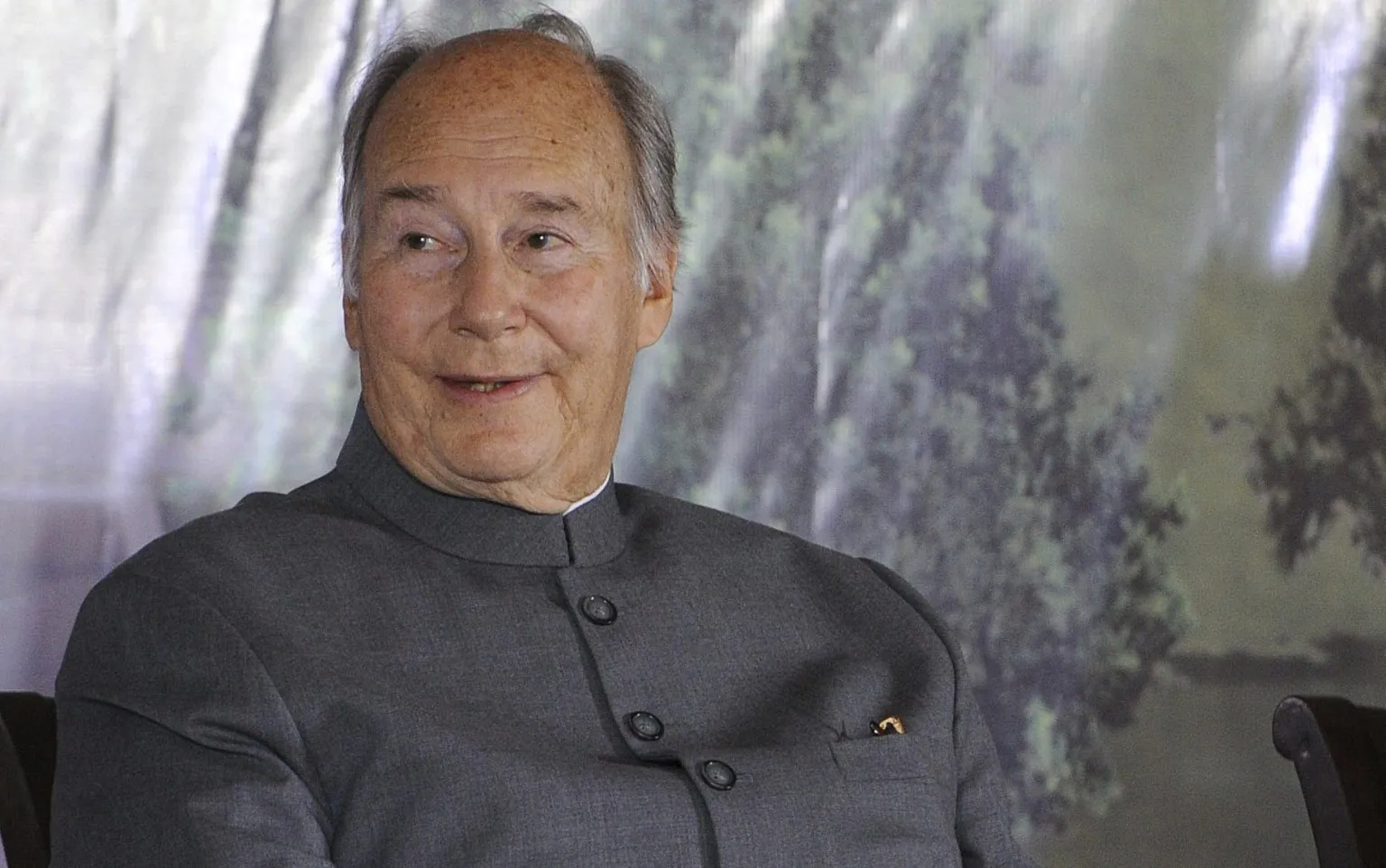International
Aga Khan, the spiritual leader of the Ismailite Muslims, dies at the age of 88 in Lisbon

Prince Karim al Hussaini Aga Khan IV, philanthropist and spiritual leader of the Ismailite Muslims, died this Tuesday in Lisbon at the age of 88 surrounded by his family.
Its foundation, the Aga Khan Development Network (AKDN), reported in a statement the death of the 49º imam of the Ismailite Shiite Muslims and “direct descendant of the prophet Muhammad.”
The note added that, after this death, his designated successor will be announced.
Born in Switzerland in 1936 and raised in this country and in Kenya, he was studying at Harvard when he was appointed imam of between 12 and 15 million Ismailites that are estimated to be in the world in 1957 by his grandfather, Sir Sultan Mahomed Shah Aga Khan.
Known for his opulent mansions and his taste for careers, Karim al Hussaini Aga Khan was known for his work as a philanthropist and being in charge of the network of institutions around the world dedicated to education, health, social and economic development, and culture.
It is not known for sure how much his fortune amounted to, there are those who place it in billions of dollars.
The Ismailites are a Shiite Muslim minority that since the 19th century has granted the title of Aga Khan to their imam, who is attributed a direct descent from Muhammad.
The imams have no control over any specific territory but exert their influence through the AKDN.
Portugal hosts one of the largest Ismailite communities in Europe, with between 8,000 and 10,000 people.
Ten years ago, the Portuguese Government and Aga Khan signed an agreement to establish the world headquarters of the Ismali Imamat in Portugal.
Three years later, Aga Khan officially designated the Henrique de Mendoça Palace in Lisbon as the global headquarters of the Ismaeli Imamat.
Among the honors he received throughout his life stands out that of “her highness”, granted by Queen Elizabeth of England in 1957, and that of “her royal highness” that was granted to her two years later by the then Shah of Iran.
Two times married and with four children, he created a business empire that goes from the banking sector to hotels.
In the 1960s he founded the luxury tourist enclave of Porto Cervo, in Sardinia (Italy), and the Costa Smeralda yacht club, which became a pole of attraction for European royalty, Hollywood actors and celebrities of the time.
Even so, in the interviews he defined himself as a religious leader rather than an entrepreneur and claimed to be focused on fighting poverty by promoting the autonomy of people and culture.
International
Florida judge sets 2027 trial in Trump’s $10 billion lawsuit against BBC

A federal judge in Florida has scheduled February 2027 for the trial in the lawsuit filed by U.S. President Donald Trump against the BBC, in which he is seeking $10 billion in damages for defamation.
Trump accuses the British broadcaster of airing a misleading edit of a speech he delivered on January 6, 2021, which, he says, made it appear that he explicitly urged his supporters to attack the U.S. Capitol in Washington.
The president filed the suit in December in federal court in Florida, alleging defamation and violations of a law governing business practices when the program was broadcast ahead of the 2024 election.
Trump is seeking $5 billion in damages for each of the two claims.
Lawyers for the BBC unsuccessfully asked the court to dismiss the case, arguing that Trump had not suffered a “legally recognizable harm,” since the investigative program Panorama, which included the edited footage, aired outside the United States.
International
Head-of-state diplomacy key to guiding China–U.S. ties, Beijing says

Head-of-state diplomacy plays an irreplaceable strategic guiding role in China–United States relations, Chinese Foreign Ministry spokesperson Lin Jian said on Thursday during a regular press briefing, when asked about high-level exchanges between the two sides.
Lin added that in a recent phone call, U.S. President Donald Trump once again expressed his intention to visit China in April, while Chinese President Xi Jinping reiterated his invitation.
Both sides remain in communication regarding the matter, the spokesperson said.
Lin noted that the essence of China–U.S. economic and trade ties lies in mutual benefit and win-win outcomes.
“Both parties should work together to implement the important consensus reached by the two heads of state, injecting greater certainty and stability into China–U.S. economic and trade cooperation, as well as into the global economy,” he said.
International
Trump administration to end special immigration operation in Minnesota

The administration of Donald Trump is bringing to a close its special operation targeting illegal immigration in the northern state of Minnesota, border czar Tom Homan announced Thursday, following weeks of unrest and the fatal shootings of two activists by federal agents.
Thousands of federal officers had been deployed to Minnesota in December to carry out large-scale raids against undocumented immigrants.
The operations triggered strong reactions from residents and advocacy groups, leading to daily confrontations and the deaths of two people who were shot by federal agents.
“I proposed, and President Trump agreed, that this special operation should end in Minnesota,” Homan said during a press conference in the state capital, Minneapolis.
“A significant drawdown began this week and will continue into next week,” he added.
Homan indicated that similar enforcement efforts could be launched in other cities.
“Next week we will redeploy the agents currently here back to their home stations or to other parts of the country where they are needed. But we will continue to enforce immigration laws,” he said.
-

 Central America4 days ago
Central America4 days agoGuatemala isolates Barrio 18 leader after attacks that killed 11 police
-

 Sports5 days ago
Sports5 days agoShakira ignites El Salvador with near sold-out residency at Mágico González Stadium
-

 International2 days ago
International2 days agoU.S. Health Department says CDC grants no longer match agency priorities
-

 International1 day ago
International1 day agoOver 50 Civil Groups Urge House to Impeach DHS Secretary Kristi Noem
-

 International2 days ago
International2 days agoICE Arrests Reach 379,000 Under Trump, Testimony Shows Amid Minnesota Shootings
-

 Central America1 day ago
Central America1 day agoGuatemala to Phase Out Longstanding Medical Cooperation Agreement with Cuba
-

 International2 days ago
International2 days agoDespite homicide drop, overall deadly violence remains high in Mexico: study
-

 International2 days ago
International2 days agoSheinbaum Urges Mexico to ‘Jealously’ Guard Sovereignty at Air Force Anniversary
-

 International2 days ago
International2 days agoJet Fuel Crisis Hits Cuba: Flights Disrupted, Air Canada Cancels Services
-

 International2 days ago
International2 days agoMEPs Approve Plan That Could Fast-Track Rejection of Some Asylum Claims
-

 International1 day ago
International1 day agoNew York’s New Archbishop Names Óscar Romero as His Favorite Saint
-

 International2 days ago
International2 days agoMexico Rises Slightly to 141st in Global Corruption Perceptions Index 2025
-

 International3 hours ago
International3 hours agoFlorida judge sets 2027 trial in Trump’s $10 billion lawsuit against BBC
-

 International3 hours ago
International3 hours agoTrump administration to end special immigration operation in Minnesota
-

 International3 hours ago
International3 hours agoHead-of-state diplomacy key to guiding China–U.S. ties, Beijing says
-

 International1 day ago
International1 day agoExclusive Tucson Neighborhood Shaken by Disappearance of Savannah Guthrie’s Mother
-

 International2 days ago
International2 days agoChile Unveils Latam-GPT to Give Latin America Its Own AI Model


























